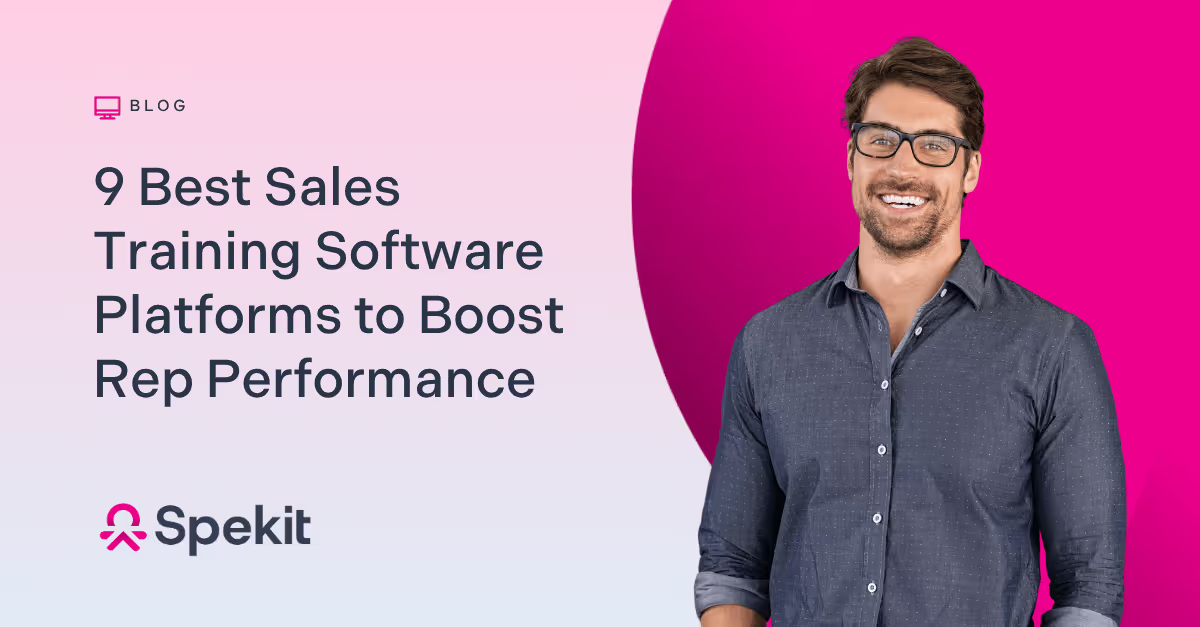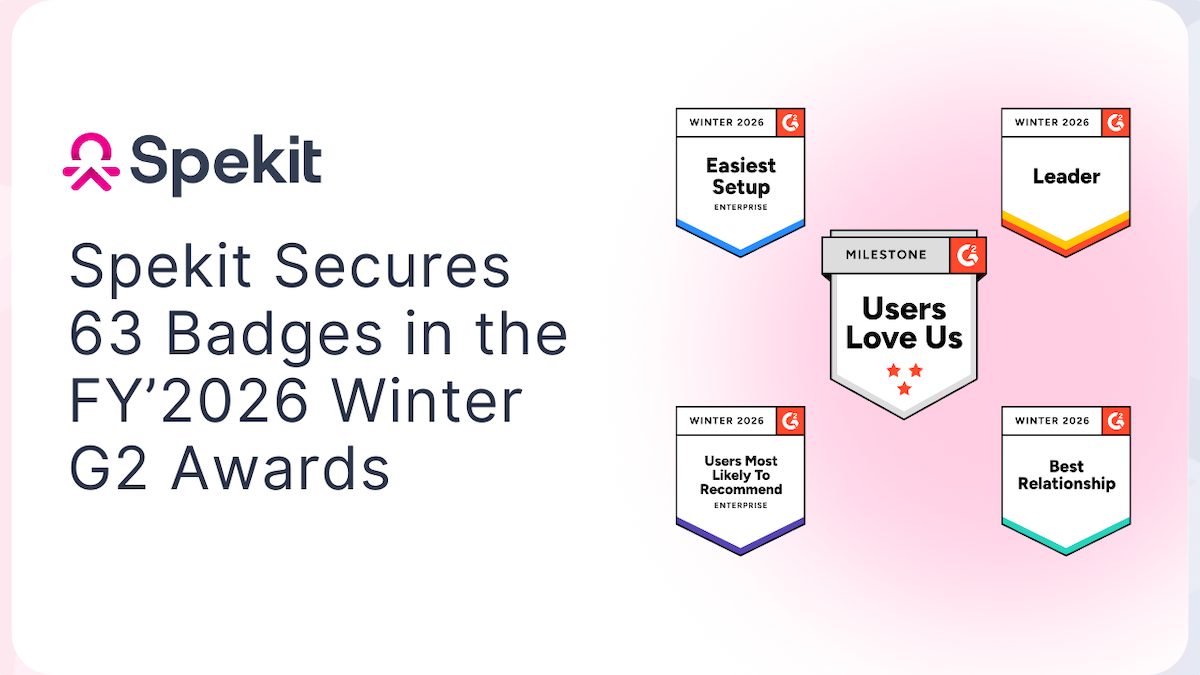Sales training materials that aren’t embedded in daily workflows go unused. And sales course completions? They don’t necessarily equal behavior change.
Whether you're ramping five sales reps or 500, those two truths should guide your choice of online sales training platform. Because when training isn’t available in the moment or reinforced over time, even the best sales content gets ignored, and reps fall back on old habits.
In this guide, we’ll break down nine top sales training software and show you which ones help with reinforcement and which are better suited for more traditional training needs.
But to choose the right sales training platform, you need to know what you’re solving for. That means looking closely at how your team trains today and what the pain point is.
We recommend you evaluate:
- Delivery format: Is training embedded within the tools reps already use, or do they need to switch contexts? For instance, Spekit offers in-the-flow training within platforms like Salesforce and Slack.
- Onboarding speed: Can new hires ramp up quickly without constant handholding? If reps need 4+ weeks to start generating pipeline, look for platforms with guided ramp-up journeys and searchable playbooks.
- Reinforcement methods: Does the platform offer features like knowledge checks or reminders to reinforce learning over time?
- Manager visibility: Can managers track engagement and application of training in real deals?
- Ease of updates: Is it straightforward to update training materials, or does it require re-recording videos and managing version control?
- Integrations: Does the platform plug into Salesforce, Slack, or Outreach to meet reps where they work?
Let’s see how the top sales training platforms stack up against these criteria.
Top sales training platforms compared
9 best sales training software & tools (in-depth review)
To help you decide, we’ve further broken down these 10 top platforms and their pros and cons, starting with Spekit, the only one built fully for in-the-flow, just-in-time training.
1. Spekit: Just-in-time sales enablement software
Spekit is the modern AI-powered enablement platform that unifies content management, enablement, and personalized guidance to help revenue teams automate workflows and close deals quicker. Spekit combines an intelligent content management platform with AI Sidekick, the just-in-time sales assistant™ that leverages signals from CRM, call intelligence, and communication tools to deliver personalized guidance, content, and recommendations directly to reps right within their flow of work.
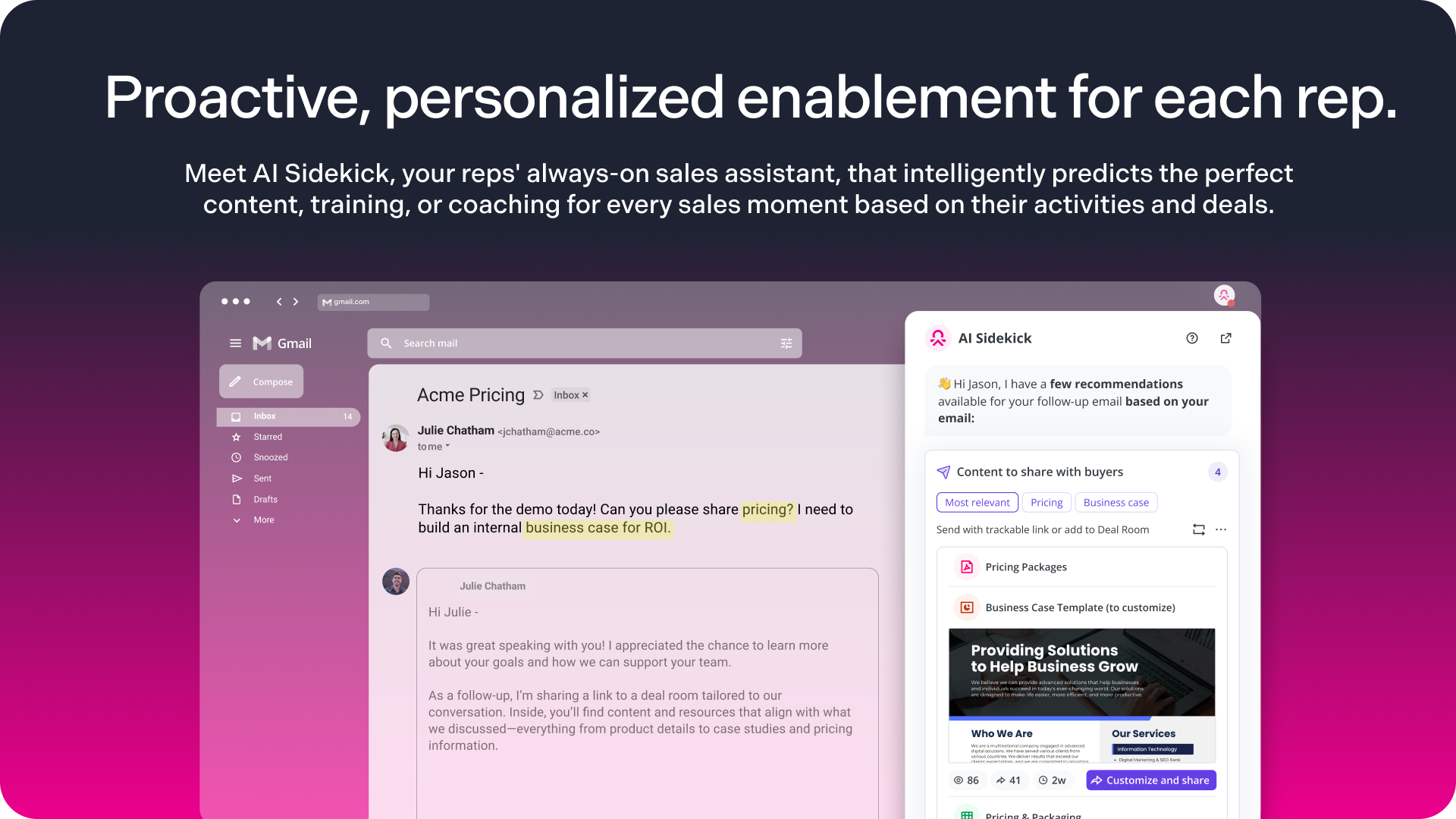
Sidekick embeds contextual AI agents into a rep’s daily tasks to anticipate needs and automate workflows like curating and creating content, or building Deal Rooms. By surfacing personalized guidance and resources directly in their flow of work, Sidekick enables reps to prepare for calls, follow up, and launch custom Deal Rooms in seconds
Granular analytics on content consumption and buyer engagement show sales leaders which initiatives move deals forward, what content directly impacts pipeline, and where performance breaks down. By combining these insights with AI-driven guidance, Spekit strengthens change management to drive stronger adoption and accelerate execution at scale.
Key features of Spekit:
- Sales content management system: Spekit is an advanced AI-powered sales content management system. Unify sales and marketing content in a single source of truth. Create content, upload assets, or sync from Google Drive, SharePoint, or Confluence. AI detects duplicates, flags outdated assets, and recommends the most relevant resources. Governance and user-level analytics keep content accurate and consistent.
- AI Sidekick: The only AI-powered just-in-time enablement assistant™ that leverages signals from CRM, call intelligence, and communication tools to deliver personalized guidance, content, and recommendations directly to reps. Sidekick agents automate content curation and creation, support change management, and orchestrate task completion with embedded tooltips.
- Deal Rooms: Centralized, branded buyer hubs that reps create and update in the flow of work with AI Sidekick. Share a single, trackable link. Changes sync immediately. Reps get real-time notifications on views and time on page, while admins see buyer engagement analytics tied to pipeline and revenue impact.
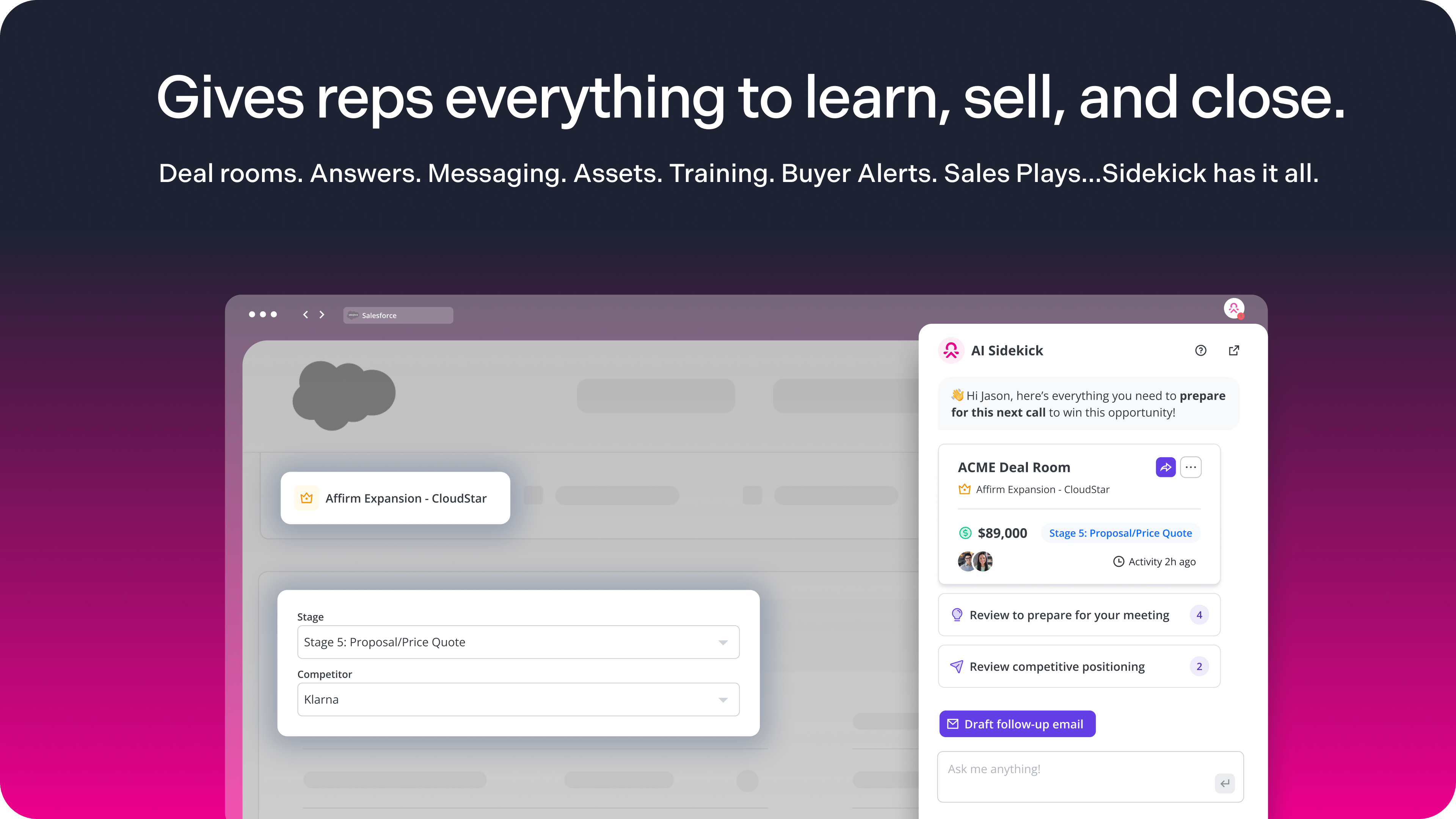
- Revenue Insights and Analytics: Connect enablement to revenue with dashboards that show influenced pipeline, influenced revenue won, and the content that drives impact. Monitor Deal Rooms created and those tied to closed-won.
- Governance Dashboards: Automated oversight flags outdated or low-adoption assets, high-priority reviews, and missing expert contributions. Manage version control, permissions, and access by team or role so only approved content reaches reps and buyers.
- Just-in-time knowledge and content delivery: Surface answers in Salesforce, HubSpot, Gmail, Outlook, Gong, LinkedIn, and Chrome through a lightweight extension. No heavy mappings.
- In-app alerts and microlearning: Targeted alerts and quick knowledge checks reinforce changes without pulling reps from work.
Best for: Spekit is best for growing teams of 20 to 500+ reps at mid to enterprise companies that want to turn real-time knowledge access into a competitive advantage their reps can leverage to learn, grow, and sell at the speed of business.
💡 Spekit acts as the connective tissue of your sales enablement stack. See how Spekit helps teams like yours spend 90% less time searching for answers.
Real customer quote:
"This morning I found three assets, generated the links, and had the email out within 2 minutes start to finish. This would’ve taken me a good 20 minutes in a previous sales content management platform and a high likelihood that I would’ve grabbed the wrong asset” - Anthony Panvini, Director Enterprise New Logos | InMoment
2. Mindtickle: Best for performance insights and certification programs
If Spekit is like a GPS guiding reps in real time, Mindtickle is more like a coach with a clipboard, tracking, scoring, and guiding improvement based on performance data.
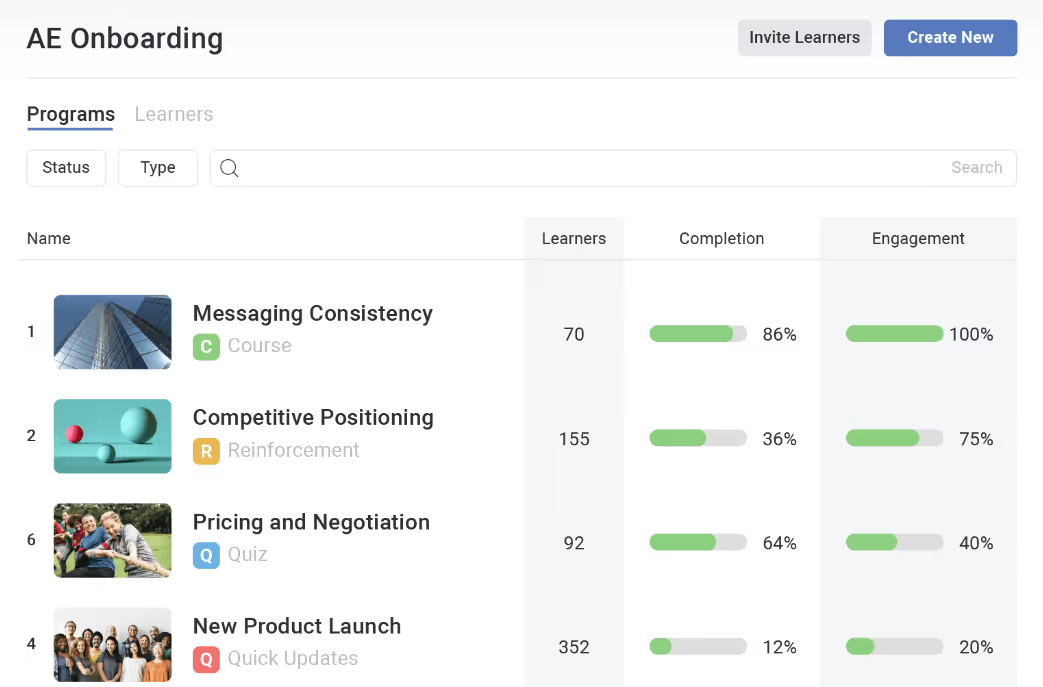
This platform shines when your sales process is mature, standardized, and heavily metric-driven. Think: formal onboarding programs, certification requirements, and continuous coaching based on deal outcomes.
It’s ideal for larger sales orgs that want to track competency gaps, assign learning paths, and tie training completion to hard performance metrics like quota attainment or conversion rates.
Let’s say a global SaaS company uses Mindtickle to roll out a structured onboarding program. They could set it up so reps wouldn’t advance to the next phase of ramp until they demonstrate call fluency, complete quizzes, and pass manager reviews, resulting in more consistent early performance and shorter ramp times.
Key features:
- Structured onboarding programs and certification paths
- Sales readiness scoring
- Call coaching and skill assessments
- Integrations with call recording and CRM tools
- Robust analytics dashboard for managers
Best for:
Enterprises with large sales teams, compliance needs, or formal certification requirements.
Pros:
- Strong analytics and performance tracking
- Great for ongoing coaching and assessments
- Proven structure for onboarding and upskilling
Cons:
- Can feel rigid or overbuilt for fast-moving or early-stage teams
Read also: Sales Enablement ROI: Why More Features Doesn't Equate to Better Outcomes
3. Lessonly by Seismic: Best for structured onboarding and process documentation
Lessonly is designed for teams that want a central place to create, manage, and assign lessons, especially for onboarding, product knowledge, and soft skills development.
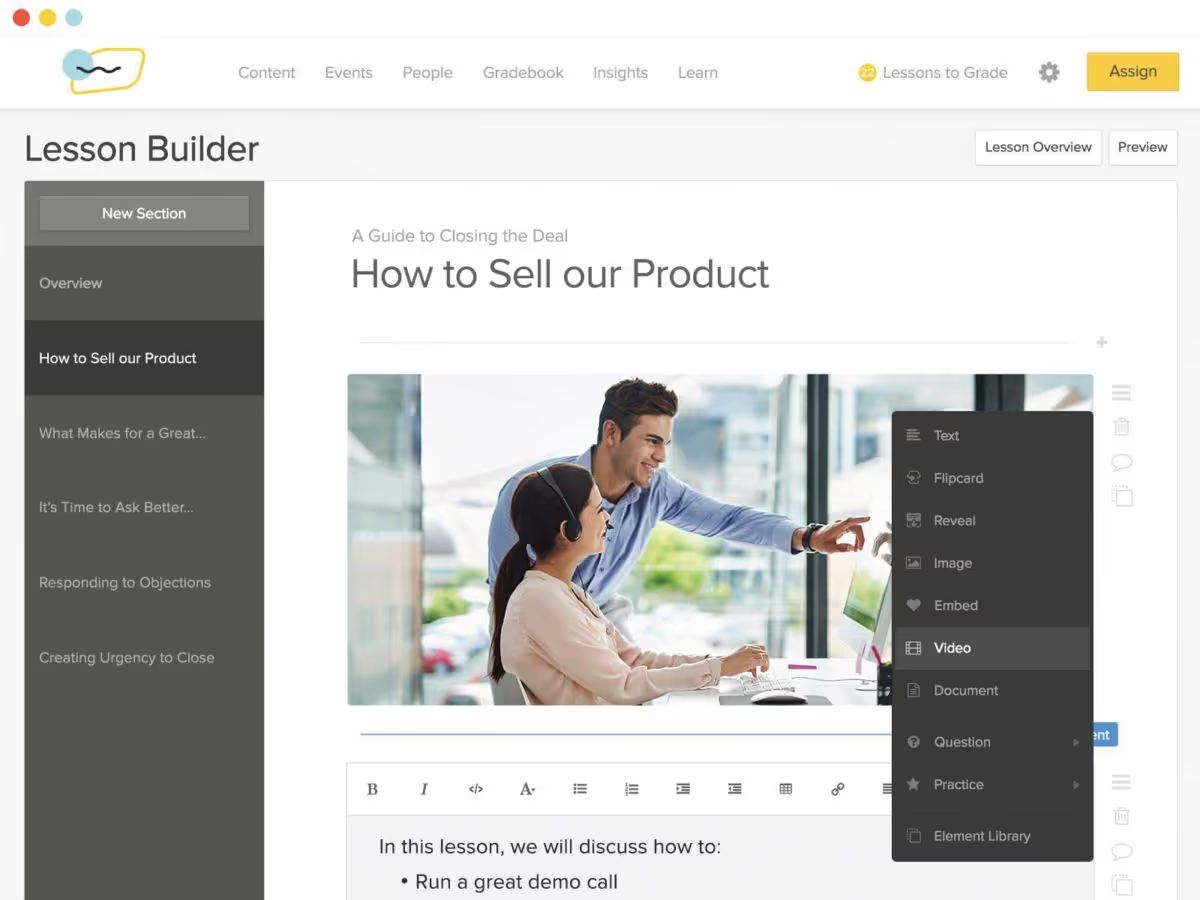
It follows a more traditional LMS format but keeps things digestible with quizzes, interactive scenarios, and light gamification such as leaderboards or badges.
Say a startup scaling from 10 to 50 reps uses Lessonly to create a full onboarding academy. They can assign manager sign-offs, practice sessions, and scorecards. Every rep would complete the same lesson track, leading to consistent messaging and fewer coaching tickets in the first month.
Key features:
- Lesson builder with templates
- Scenario-based quizzes and feedback tools
- Manager review and approval workflows
- Analytics on completion and scoring
Best for: Teams building structured enablement from scratch
Pros:
- Easy lesson authoring
- Works well for multiple departments (sales, support, etc.)
- Integrates with Seismic for content management
Cons:
- Less contextual than in-flow tools
4. Allego: Best for video coaching and peer learning
Allego delivers sales coaching through video, helping reps learn by doing and get feedback from peers and managers. It’s like TikTok meets roleplay practice.
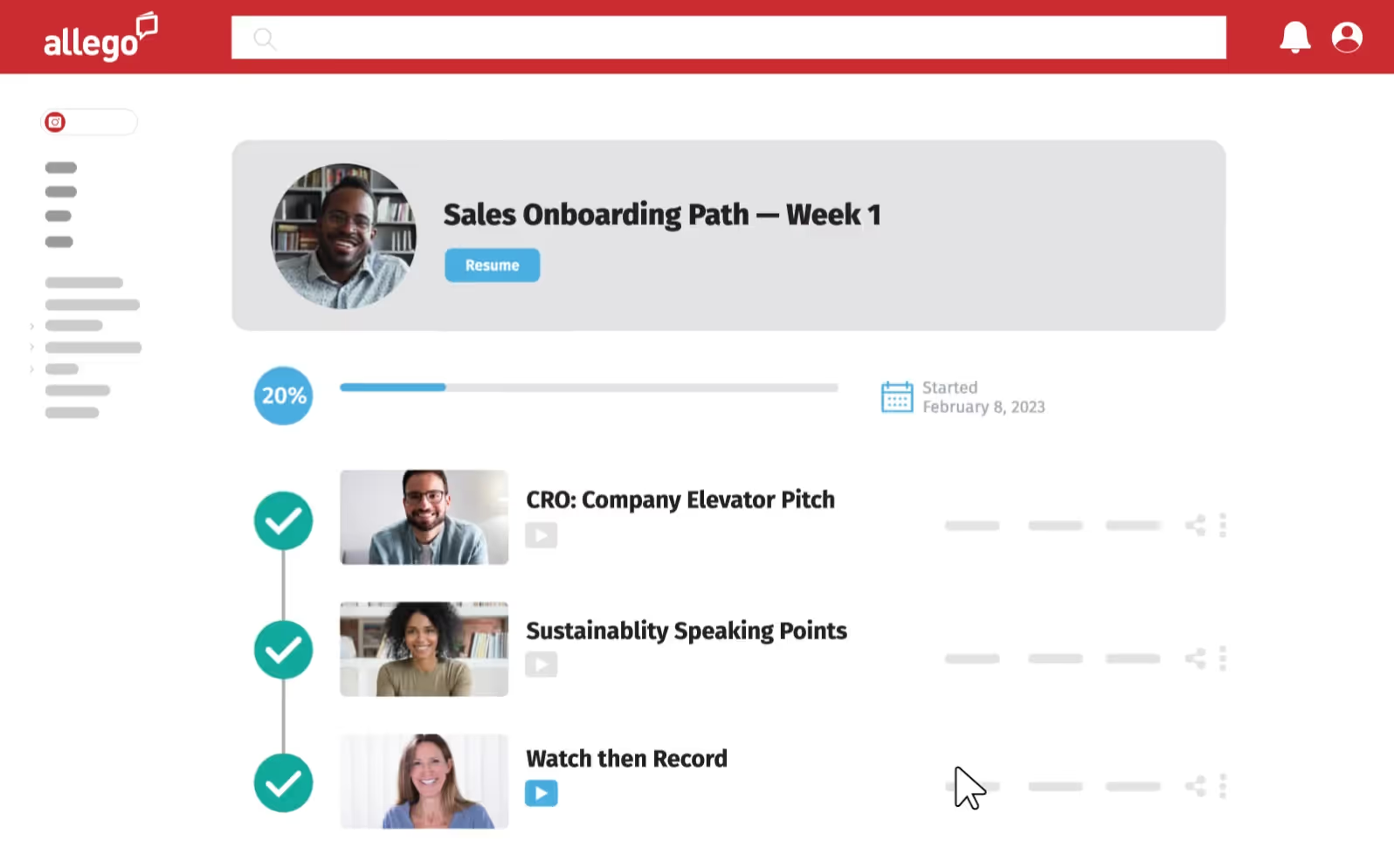
You can assign a prompt (e.g., handle an objection), then reps record their response for feedback. Great for practicing talk tracks, demos, and discovery questions.
For example, a B2B company may use Allego to run weekly video challenges where reps submit prospecting pitches. Top-rated videos can then be shared team-wide, creating a culture of peer learning and healthy competition.
Key features:
- Async video coaching and feedback
- Peer-to-peer collaboration tools
- Content library for pitch examples and top calls
- Mobile-friendly for on-the-go practice
Best for: Reps who learn by doing and teams that thrive on peer feedback
Pros:
- Engaging format for reps
- Promotes knowledge-sharing across teams
- Makes coaching scalable
Cons:
- Limited written or process-based training
5. WorkRamp: Best for blended learning across departments
WorkRamp is an enablement LMS that serves multiple teams, including sales, CS, and HR. It’s flexible, allowing you to build formal sales training programs alongside quick resource libraries.
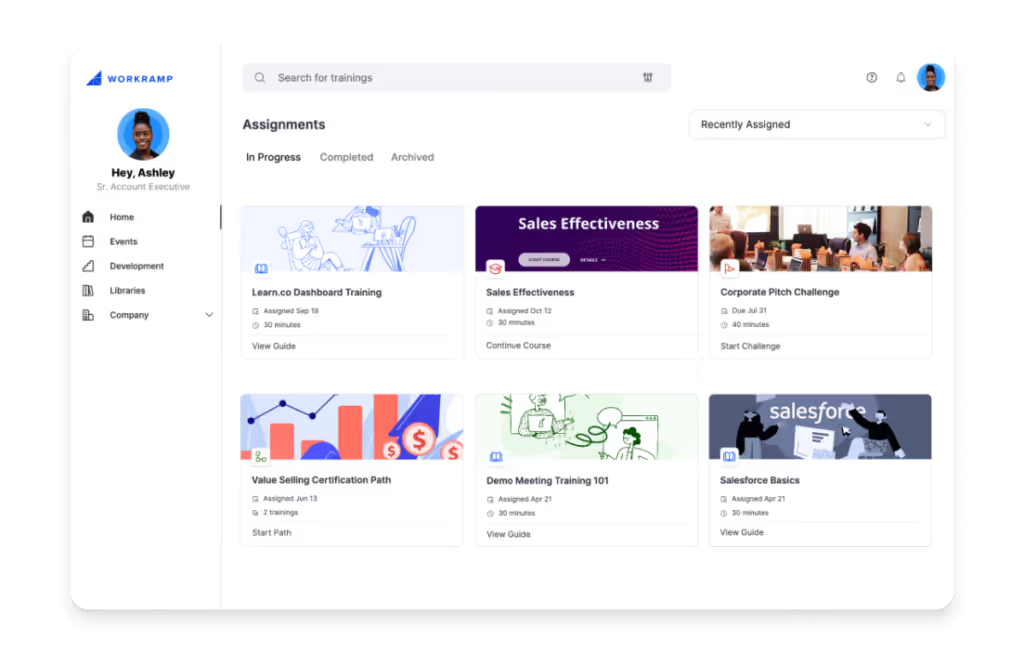
For example, a company with 5 GTM teams could use WorkRamp to house rep onboarding, live workshops for CS, and compliance training for HR all in one platform. Each team will have its own dashboard and training path.
Key features:
- Course builder for structured training
- Live session management and reminders
- Team-based views and admin controls
- Reporting and assessments for each module
Best for: Multi-team orgs needing one centralized platform
Pros:
- Clean interface, easy setup
- Works for onboarding and ongoing training
- Supports hybrid learning (live + async)
Cons:
- Requires team buy-in to maintain quality
- Not purpose-built for in-the-moment sales use
6. Trainual: Best for documenting repeatable processes
Trainual is the go-to tool for small businesses that want to document everything from sales scripts to SOPs to HR policies.
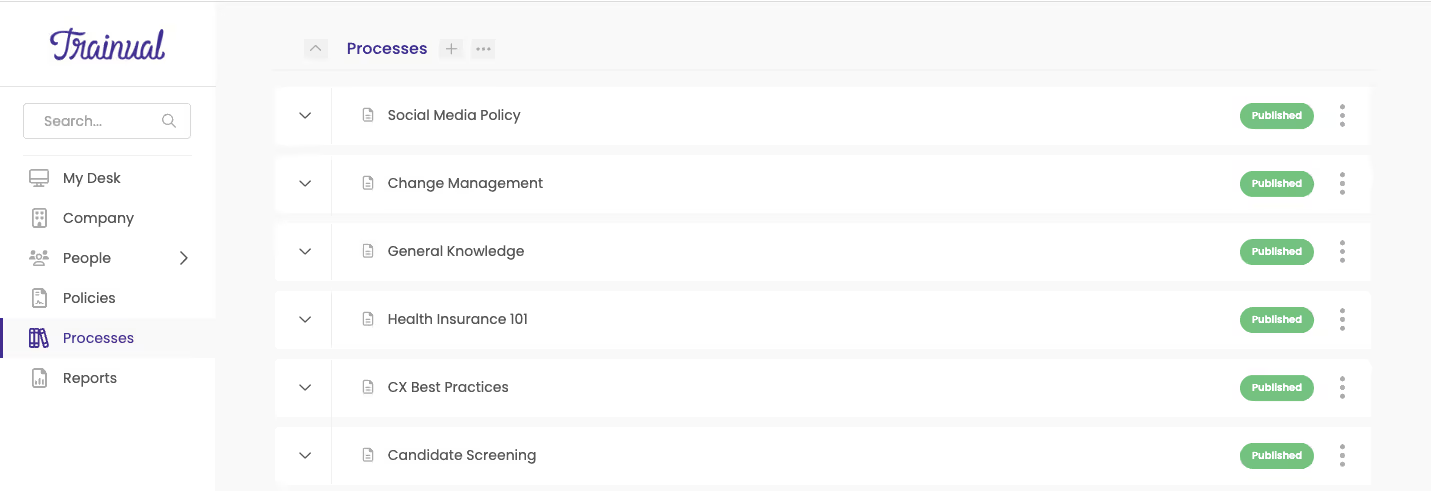
It’s less of a training platform and more of a searchable company wiki that can be assigned, tracked, and version-controlled.
Let’s say a franchise network used Trainual to document sales checklists and brand guidelines across 40+ locations. Anytime a process changes, HQ pushes updates instantly, and every store gets notified.
Key features:
- Step-by-step playbook builder
- Assignable training paths for new hires
- Version control and compliance tracking
- Quizzes and read receipts
Best for: Small businesses, franchises, or agencies scaling documentation
Pros:
- Easy to manage SOPs and how-tos
- Works across departments
- Helps preserve tribal knowledge
Cons:
- Not sales-specific
- Doesn’t integrate deeply into workflows
7. Saleshood: Best for structured onboarding in distributed teams
Elay Cohen, Salesforce’s former SVP of Sales Enablement built Saleshood, so it’s no surprise that it focuses on fast, scalable, and repeatable onboarding for growing sales teams.
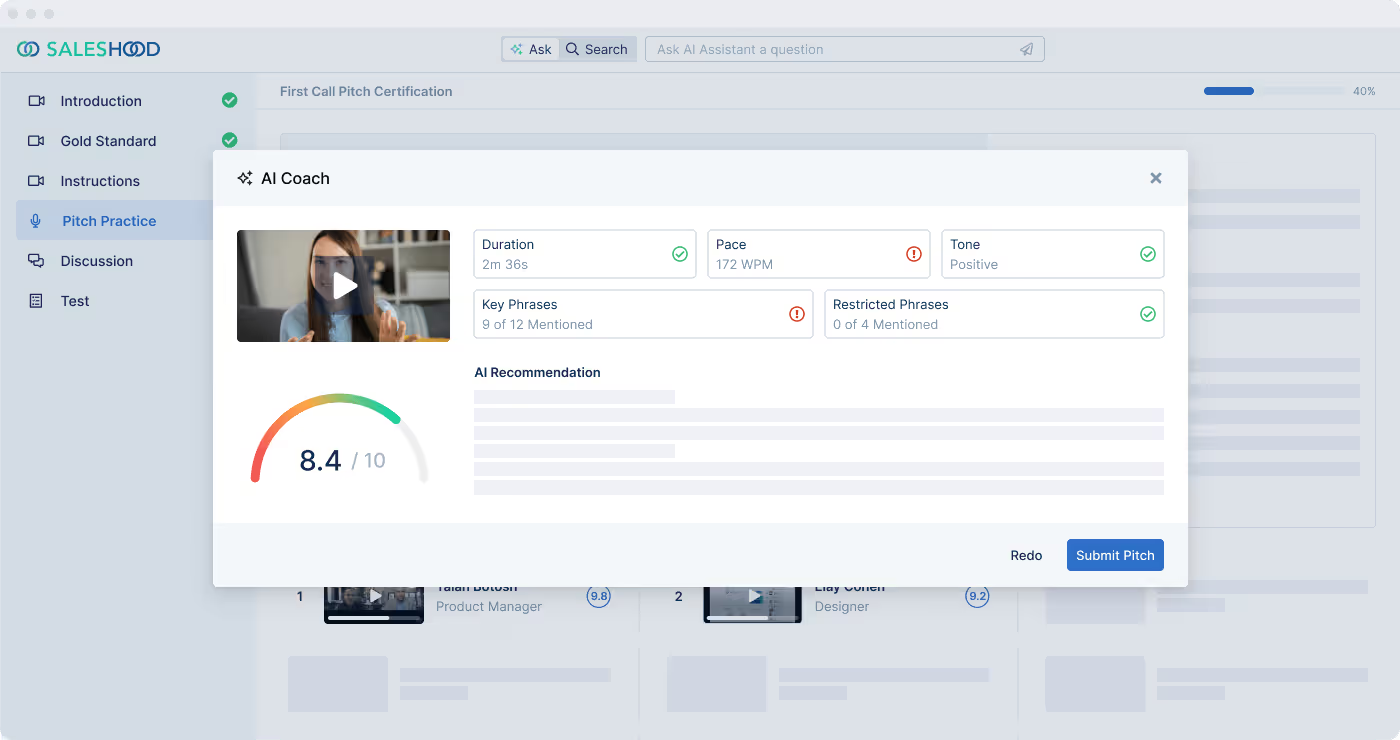
The platform offers pre-built onboarding paths, training libraries, and a cadence-based learning system ideal for remote or global teams.
For example, a SaaS company with reps in five countries may use Saleshood to run time-zone-friendly onboarding in weekly “learning pods.” Each pod completes the same curriculum, records deal walkthroughs, and receives certification before going live.
Key features:
- Pre-built sales onboarding templates
- Deal win stories and customer storytelling modules
- Certification and video-based learning paths
- Content analytics and engagement scoring
Best for: Global or distributed teams with limited enablement headcount
Pros:
- Excellent for asynchronous onboarding
- Includes field-ready win stories and peer examples
- Easy to customize learning tracks
Cons:
- Video-based format may not work for quick-reference learning
8. Showpad Coach: Best for aligning training with sales content
Showpad Coach brings sales training and content under one roof so reps don’t just learn what to say, but also when and where to use the right collateral.
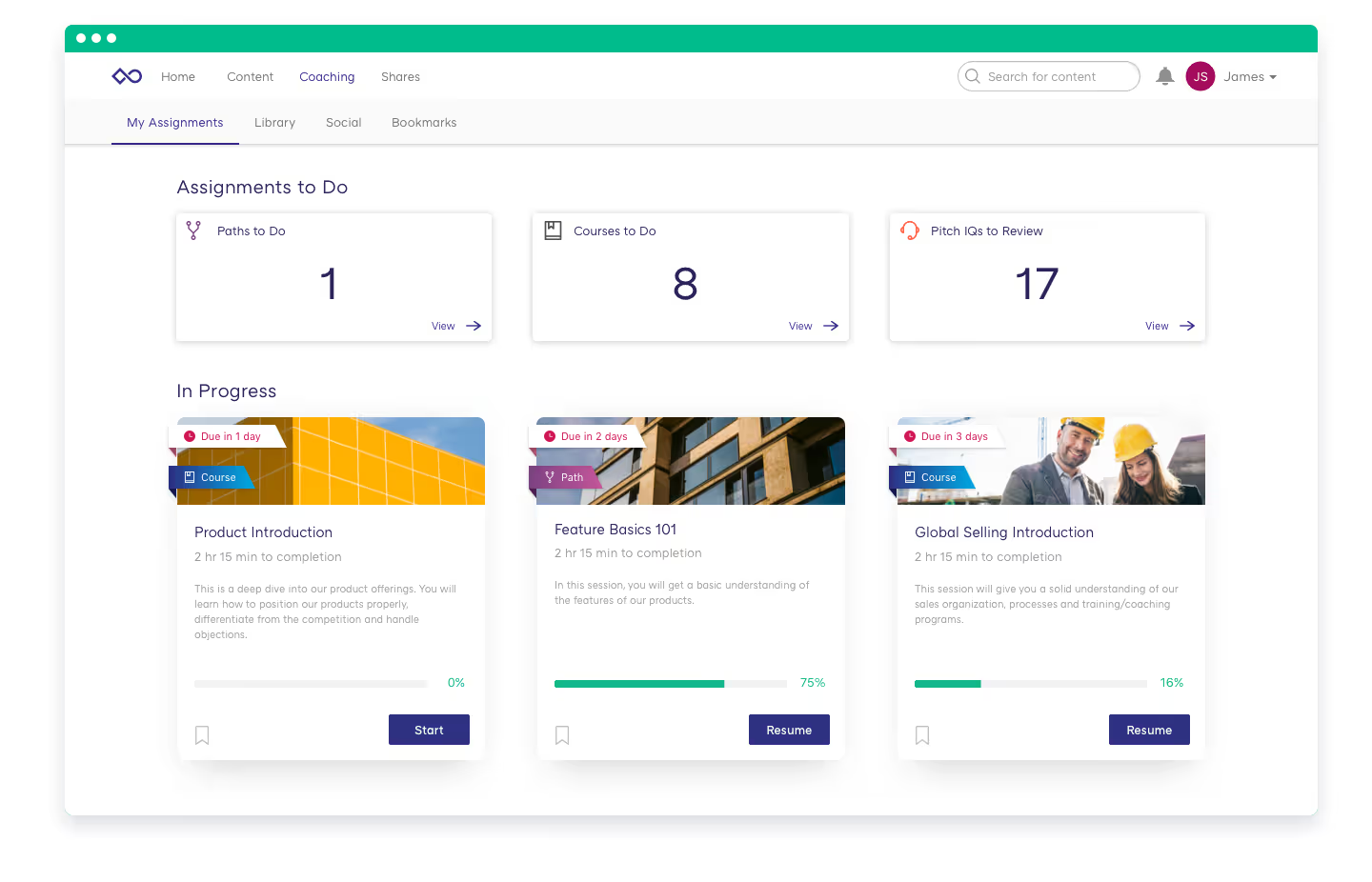
It pairs microlearning with a strong asset management system, making it a great fit for marketing-aligned sales orgs.
Let’s say a company uses Showpad Coach to train reps on product launches. Each training can include quick video modules, knowledge checks, and direct links to updated pitch decks. That way, reps are better prepared and share more accurate content during calls, measurably increasing conversion.
Key features:
- Video-based training tied to content assets
- Centralized library for pitch materials, playbooks, and decks
- Roleplay submissions and peer feedback tools
- Integration with Showpad Content, Salesforce, and Outlook
Best for: Sales + marketing-aligned orgs with frequent asset updates
Pros:
- Combines learning and content in one workflow
- Great for reinforcing messaging consistency
- Mobile-friendly interface
Cons:
- Less flexible outside of the Showpad ecosystem
- Not focused on just-in-time delivery
9. Continu: Best for cross-functional learning with sales modules
Continu is a flexible LMS that works across departments like sales, CS, HR, marketing but still offers enough customization to serve sales-specific needs like onboarding and product training.
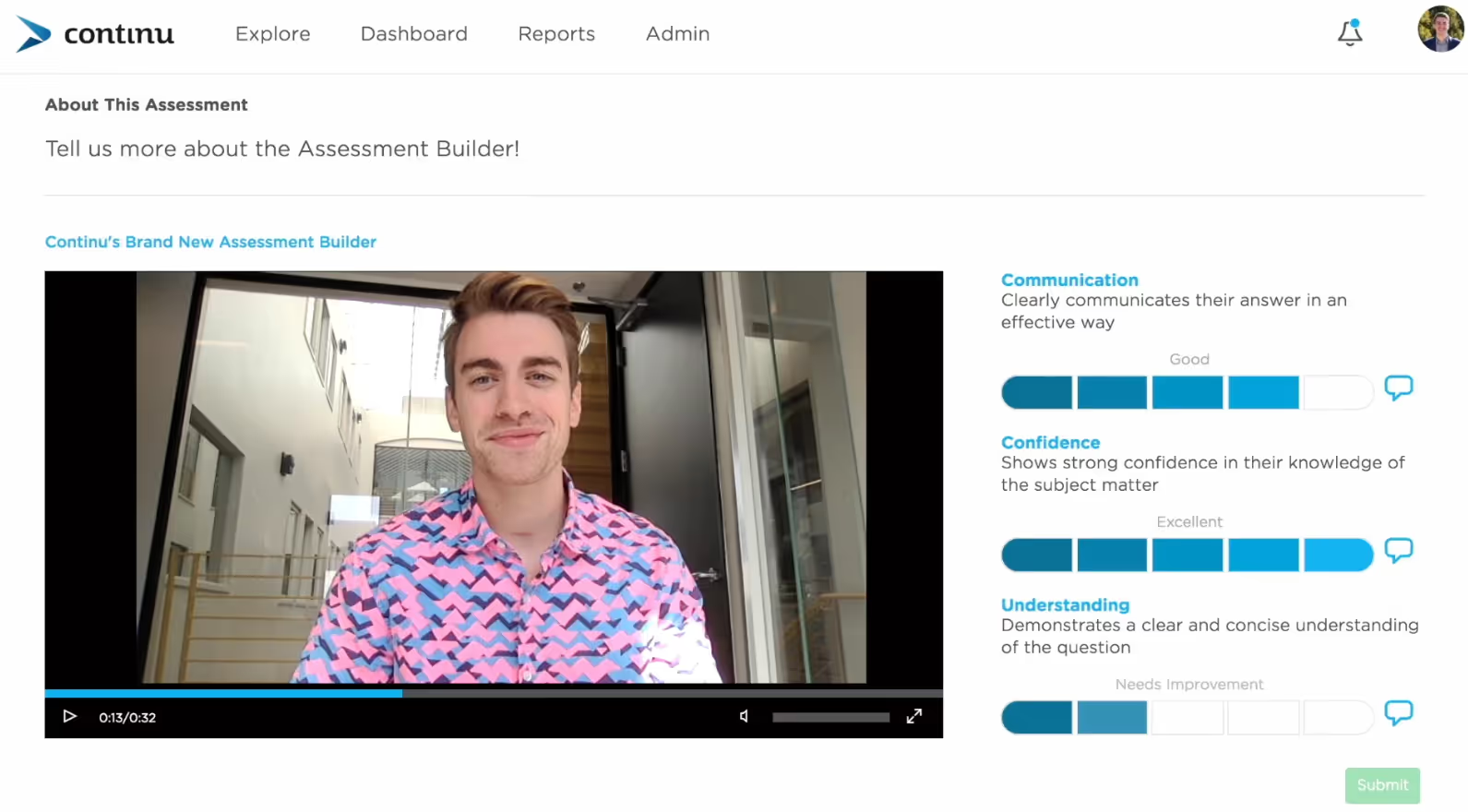
It’s a modern alternative to legacy LMS systems, with live session support and Slack integrations that make adoption smoother.
For example, a fintech company may use Continu to onboard reps, deliver weekly product updates, and host live demo training sessions. Sales managers can track attendance and quiz scores while CS uses the same platform for customer training.
Key features:
- Course creation with video, documents, and live events
- Slack and Zoom integration
- Centralized dashboard by team or function
- Certification and progress tracking
Best for: Companies that want one LMS for multiple GTM teams
Pros:
- Easy admin controls
- Smooth UI and Slack alerts for reminders
- Good for live training + async learning
Cons:
- More general-purpose than sales-specific
- Not optimized for embedded guidance in CRMs
Read also: 12 Sales Enablement Best Practices
Use case matchmaker — Which sales training tool is right for you?
Not every sales team has the same training challenge. Some need to onboard fast. Others want formal certifications or rich content libraries. Use this quick guide to match your use case with the best-fit sales training platform:
The best sales training software is the one that drives action
Whether you're buying for a startup team or a global org, an effective sales training platform isn’t the one with the most features, it’s the one your reps will use.
That means more than tracking completions. It means choosing tools that embed training into the apps reps already use, like Salesforce or Slack. It means surfacing guidance in the exact moment reps need it, not burying it in portals or onboarding decks they’ll forget. And it means reinforcing what matters, over and over, until it sticks.
Tools like Spekit do this by delivering just-in-time guidance directly in the workflow. Others like Mindtickle or Lessonly help build structured sales training programs and track readiness at scale. The right platform for you depends on your team, training goals, and how embedded you want that training to be.
If your goal is to drive action, not just awareness, choose the platform that makes learning a habit, not a hurdle.

